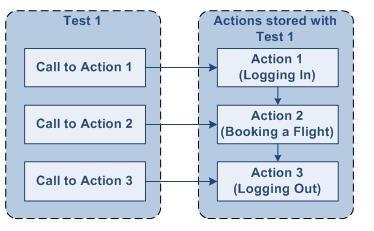Actions in QTP, Actions help create
script which modular efficient, Action Quick Test Professional
Here we will describe the Actions. This
section is the longest compare to all other QTP tutorials sections.
Let's start and check and view
carefully for the actions of QTP:
- With the help of Actions you can divide your test scenarios into business processes and logical units.
- Creating script is helpful and possible by the Actions which is more efficient and modular.
- Newly created or developed script consist only one action. But a script can consist of multiple actions.
- Two types of Actions are there I. Reusable Actions and ii. Non – Reusable Actions
- Reusable Actions as it name suggest, These can be used multiple time in same scripts and another test also.
- Non – Reusable Actions can not be used multiple times in same scripts and one time execution in a Independent to each other, it break the selected action into 2 sibling actions. 2. Nested Action It break the selected actions into a hierarchy of parents and child actions, one step is Parents Action and another one is child action.
single script also. An Existing actions can be split into following two ways: 1.
Actions in QTP
- Two types of Data-sheets has been provided by the QTP : I. Global and 2. Local
- Global Datasheet: For the entire test it will be unique. Any action can be access and write into global datasheets. It has named as “GLOBAL”.
- Local Datasheet: Number of the Actions will be equal in this sheet. An Action can write & read records from its own local datasheets only. Default Sheet Name equal to “ACTION NAME”.
- TWO TYPE of methods are used to import the actions into any test I. Call to Copy and ii. Call to existing.
- Call To Copy Actions : When you do the copy of an action, The action is copied in its completeness, including the parametrization, checkpoints and the corresponding action tab in the record table in the called test. When you enter the copy of any existing actions, Then changes can be copied action and you changes will not effect nor be affected by another test. You can include the non-reusable and reusable both actions.
- Call to an EXISTING Action : Calls to actions is called read only in its calling test. They can be modified in the test where they were generated. Enables you to use the same action in multiple test and makes very easy to maintains the test. You can make calls to only “Reusbale” actions.
- Action iteration frequency can be changes by selecting the Action Call Properties > Run Tab.
Android Install Apps to SD Card Default Developer vs Tester a fake competition
QTP TESTING STEPS How to Record a QTP Script










No comments:
Post a Comment